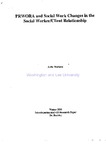PRWORA and Social Work: Changes in the Social Worker/Client Relationship

View/
Author
Walberg, Jodie
Subject
Washington and Lee University, Shepherd Poverty Program
Aid to families with dependent children programs
Social workers -- Training of
Social workers -- Attitudes
Interpersonal relations
Personal Responsibility and Work Opportunity Reconciliation Act of 1996 (United States)
Temporary Assistance for Needy Families (Program)
Virginia Initiative for Employment not Welfare
Metadata
Show full item recordDescription
Jodie Walberg is a member of the Class of 2002 of Washington and Lee University. Capstone; [FULL-TEXT FREELY AVAILABLE ONLINE] The 1996 welfare reform law, Personal Responsibility and Work Opportunity Reconciliation Act (PRWORA), alters the nature of welfare and in turn, the nature of service provision. The general attitude of service provision changes dramatically from an aid-based program, requiring little of those who receive, to a temporary assistance program, requiring much of social workers and clients alike. Furthermore, this alteration in the attitude of welfare dramatically alters the way in which service providers and their clients relate with one another. It also changes the manner in which the social worker morally views his/her client. Although not all changes in the relationship are positive, the new attitude has the potential to greatly improve the relationship. Examining the changes in the client/social worker relationship, as well as the manners in which services are provided is a necessary component in determining the successes of PRWORA. [From introductory section]